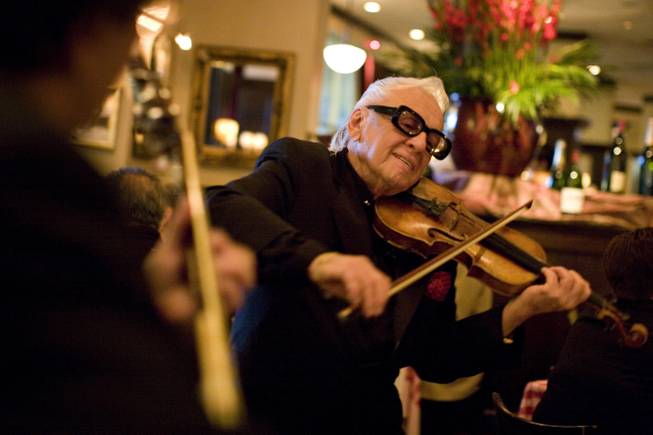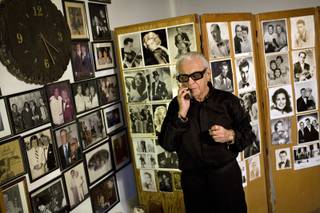Sunday, Jan. 25, 2009 | 2 a.m.
The Violinist
Holocaust survivor Sasha Semenoff, 84, celebrates 50 years of music in Las Vegas this year.
The 84-year-old violinist looks as if he stepped out of GQ — natty blue turtleneck and matching jacket, snow-white hair carefully combed, oversized black-rimmed glasses.
For the 50 years Sasha Semenoff has played in Las Vegas, he has always dressed impeccably. He wears a tuxedo when he performs, as he did alongside the likes of Frank Sinatra, Elvis Presley and Barbra Streisand, and wears sharp sports clothes at other times.
Semenoff was conscientious about how he dressed even as a teenager in Nazi concentration camps. Playing music for Nazis saved his life, before disease and malnutrition eroded his strength.
“I did my best to keep fit,” Semenoff says, sitting at a sidewalk table outside a Starbucks recently, sipping coffee and remembering a time in his life when coffee was almost all he had to live on. “When I worked in the kitchen, many prisoners were covered in lice and dirt, but I always washed my stuff and kept everything clean.”
After the war, Semenoff immigrated to the United States and eventually to Las Vegas, where the good life belies his past.
•••
He was born Abram Shapiro in Riga, Latvia. His father was a clerk in a textile factory, his mother a housewife. His older sister studied piano and had aspirations to be a doctor. His uncle, Simon Semenoff, was a dancer and choreographer with Ballet Russe in Paris and Monte Carlo who immigrated to the United States during the war.
“I grew up in a musical family,” Sasha Semenoff says, his voice soft and heavily accented. “I started playing piano when I was 6 or 7 ... then I told my dad I wanted to learn the violin. I had listened to violin music, to Jascha Heifetz and to gypsies. So on my ninth birthday I got a violin.”
He wasn’t quite 16 in 1940, when the Soviet Union took over the Baltic countries and occupied Latvia.
“No one liked communism, but we thought they would stop the Nazis from occupying us,” Semenoff says. “We knew what was going on in Germany — German Jew refugees told us — but we ignored them. We didn’t think it would happen to us.”
Life went on as usual under the Russians for about a year, then the Germans took over the Baltics and everything changed. Semenoff’s older sister heeded the warnings and fled with the retreating Russians. The rest of the family stayed.
“We lost our rights completely. We had no one to turn to,” Semenoff states matter-of-factly, the bitterness of the past not forgotten but not controlling his life. “We knew it was the beginning of the end. The first night of occupation they rounded up the Jewish men. They took my dad away and I never saw him again.”
Barely 5-foot-3, Semenoff passed for a child and was allowed to stay with his mother. Jews who weren’t sent to concentration camps were sent to a ghetto divided by the sexes — men in one area, women and children in another.
A Latvian Nazi, Herbert Cukurs, took over the Shapiros’ apartment and forced Sasha to come at night to play the piano that had belonged to the family. He credits playing the piano with keeping him alive during the early days of the German occupation.
After four months he was moved to the men’s ghetto. His mother and most of his family were taken away and he never heard from them again.
“My whole family was gone,” he says, except his sister, who had fled with the Russians.
Semenoff worked in a factory making soldier uniforms. He was assigned to the kitchen, peeling potatoes, washing pots and pans. “I would scrape the bottom of the pans and give the scraps to prisoners lined up outside.”
Then he was moved to Lenta, a concentration camp in Latvia, and finally by boat to Stutthof, a camp near Gdansk, Poland.
“My violin was gone but I had a mandolin with me,” Semenoff says. “On the voyage a German guard asked me to play ‘La Paloma.’ I don’t know what would have happened if I hadn’t known the song.”
When he arrived in Gdansk he saw prisoners, gaunt, pale and dressed in stripped clothes, marching like dead people.
“We saw what was in store for us.”
Death was everywhere — by hanging, in gas chambers, from starvation. The prisoners were given a piece of bread and a cup of black coffee in the mornings and soup at night. When someone died, inmates would take the dead person’s rations until the smell of death alerted guards to take out the body, Semenoff says.
“Everyone had dysentery. When I was liberated I weighed 80 pounds.”
He caught typhus and scarlet fever and became too ill to work.
“I was dying when on March 10, 1945, the Nazis left,” he says. “The Russians chased the Nazis out.”
•••
Semenoff spent time recovering in hospitals in Europe before finding his sister living in Soviet-occupied Latvia. She was getting her medical degree and was about to be married, and she didn’t want to leave. Semenoff had used forged papers to get into the country and had to leave within two days, not enough time to persuade his sister to join him.
While he was in Czechoslovakia the Red Cross gave him a violin. He made his way to American-occupied Germany, where he spent four years waiting for permission to immigrate to the United States. He studied music and organized a band that performed in nightclubs in Munich.
He finally made it to the United States in 1949 and found his uncle, Simon, who was living in Hollywood, where he choreographed films, theater and even “Sleeping Beauty” for the American Ballet Theatre.
Sasha joined him and took his last name for stage. “But I couldn’t make it there,” he says.
So he went to New York, joined the musicians union and in 1950 began performing at the Waldorf-Astoria before going on the road with big bands.
“I played the Borscht Belt in the Catskills where I met people like Jerry Lewis,” Semenoff says.
He also met his future wife, Sylvia, who was a frequent guest at the resorts. They dated for several years before getting married in 1954.
•••
In 1959 a friend called from Las Vegas and told him 10 violinists were needed for a lounge act at the Desert Inn.
“We were booked for two weeks and stayed for four years,” Semenoff says.
He has rarely been idle since arriving in Vegas, with long-running engagements at the Dunes, Caesars Palace and other resorts. “I opened the MGM Grand and the Excalibur.”
He performed with the Rat Pack (the real one) and at most of Frank Sinatra’s private parties. “When he married Mia Farrow, I had the violins behind him,” Semenoff says.
He was violinist for the Las Vegas Hilton (former International) when Barbra Streisand first performed there, and then he played for Elvis. Semenoff opened the Venetian in 1999 and performed there until recently.
He has appeared in several movies shot in Vegas, including “Honeymoon in Vegas,” “Vegas Vacation” and “Casino,” his hair dyed jet black to play the orchestra leader.
“All the mobsters in ‘Casino,’ I knew all those guys,” Semenoff says.
•••
Sitting outside Starbucks, drinking down the last of his coffee, basking in the bright sunlight in the chilly afternoon air, Semenoff has few complaints. It’s hard to complain about anything after surviving one of the bleakest periods in world history.
“I have a great life,” he says.
He cherishes family, making an annual trip to Israel to visit his sister and her children. He sent her money in 1973 when the Soviet Union allowed Jews to emigrate to Israel. He also visits his sons and grandsons in Northern California.
His wife died nine years ago. “It was a big loss for me,” he says. “We were married for 49 years.”
He tried retirement, but didn’t like it.
“I enjoy what I’m doing,” Semenoff says. “Sitting home and watching TV would drive me crazy. I don’t like sitting at home by myself.
“I’m just going to keep going as long as I can. One of these days I may not be able to play, but as long as I can I will.”
Semenoff performs for the dinner crowd at Maggiano’s Little Italy Restaurant at Fashion Show Mall Sundays through Wednesdays. Until recently he also worked three nights at another restaurant. He gives private music lessons. He sometimes performs for outdoor weddings at Mandalay Bay.
“I would like to find something for weekends, maybe take one day off,” he says, “but I don’t mind working seven days — it’s not hard work. I enjoy playing.”



Join the Discussion:
Check this out for a full explanation of our conversion to the LiveFyre commenting system and instructions on how to sign up for an account.
Full comments policy